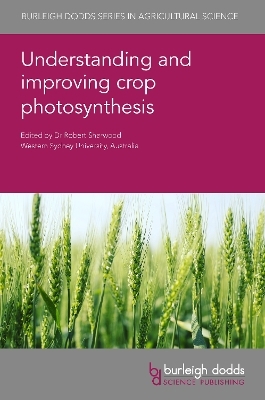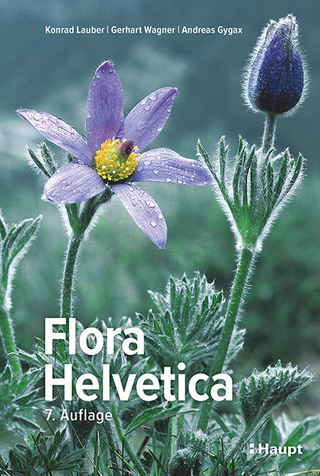
Understanding and Improving Crop Photosynthesis
Burleigh Dodds Science Publishing Limited (Verlag)
978-1-80146-129-0 (ISBN)
“The volume stands out for its principal focus on photosynthetic improvement yet supports this focus by providing essential basic background that allows readers to understand and appreciate the most promising strategies for enhancing photosynthetic productivity in C3 crops…The chapters in Understanding and improving crop photosynthesis follow well the Burleigh Dodds model of providing a rich assortment of references, particularly recent references representing the state of the art for each subject. The chapters also close by highlighting key reviews and websites where readers can seek additional updates and information. These additional resources bridge the gap between the advanced topics discussed in each chapter and general introductions...The book will be appreciated by a wide range of scholars, from advanced undergraduates to established experts looking to keep abreast of developments in the field.” (Book Review Published in Annals of Botany – Professor Rowan F. Sage, University of Toronto, Canada)
It is widely recognised that photosynthesis in many important crops is well below its theoretical potential. With crop yields and stability under threat from the impact of climate change, there is now an urgent need to synthesise existing research on best practices for improving C3 photosynthesis in crops to optimise sustainable crop production and yields.
Understanding and improving crop photosynthesis reviews the wealth of current research that addresses this challenge. The book explores our understanding of the general components of C3 photosynthesis, including its biochemistry, as well as the recent advances in techniques for improving photosynthesis, focussing primarily on light harvesting and optimising chloroplast function/light conversion.
Through providing its readers with a comprehensive exploration of crop photosynthesis, the book showcases how farmers can utilise their understanding of the science behind this key process to optimise their yields and achieve successful crop production.
Dr Robert Sharwood is Senior Lecturer and Vice Chancellor’s Fellow in the Hawkesbury Institute for the Environment and the School of Science at Western Sydney University, Australia. He was formerly an ARC DECRA Fellow at the Australian National University. Dr Sharwood is internationally known for his research on understanding and improving photosynthetic biochemistry in plants to produce more resilient crops in the face of climate change. Lisa Ainsworth is the Research Leader of the USDA ARS Global Change and Photosynthesis Research Unit and Professor of Plant Biology at the University of Illinois Urbana-Champaign. She has held leadership roles in the American Society of Plant Biologists, the International Society for Photosynthesis Research and the American Association for the Advancement of Sciences. In 2019, Lisa was awarded the National Academy of Sciences Prize in Food and Agricultural Sciences and was an elected member of the National Academy of Sciences in 2020.
Part 1 General
1.Understanding the biochemistry of C₃ photosynthesis in crop plants: C. A. Raines, A. P. Cavanagh, C. Afamefule, K. Chibani, H. Gherli, P. Lopez, V. Mengin, B. Moreno-García and S. Wall, The University of Essex, UK;
2.Understanding the genetics of C₃ photosynthesis in crop plants: P. Carvalho, G. Elias da Silva and N. J. M. Saibo, Instituto de Tecnologia Química e Biológica António Xavier da Universidade Nova de Lisboa (ITQB NOVA), Portugal;
Part 2 Improving photosynthesis: light harvesting
3.Interactions between photosynthesis and the circadian system: Marina Viana Queiroz, Universidade de São Paulo, Brazil; and Martin William Battle and Matthew Alan Jones, University of Glasgow, UK;
4.Modifying photosystem antennas to improve light harvesting for photosynthesis in crops: Min Chen, The University of Sydney, Australia; and Robert E. Blankenship, Washington University in St Louis, USA;
5.Relaxing non-photochemical quenching (NPQ) to improve photosynthesis in crops: Johannes Kromdijk, University of Cambridge, UK and Carl R. Woese Institute for Genomic Biology, University of Illinois at Urbana-Champaign, USA; and Julia Walter, University of Cambridge, UK;
6.Modifying mesophyll conductance to optimise photosynthesis in crops: Coralie E. Salesse-Smith, University of Illinois at Urbana-Champaign, USA; Steven M. Driever, Wageningen University and Research, The Netherlands; and Victoria C. Clarke, The Australian National University, Australia;
7.Modifying canopy architecture to optimize photosynthesis in crops: Anthony Digrado and Elizabeth A. Ainsworth, Global Change and Photosynthesis Research Unit, USDA-ARS and University of Illinois at Urbana-Champaign, USA;
Part 3 Improving photosynthesis: optimising chloroplast function/light conversion
8.Modifying photorespiration to optimize crop performance: Xinyu Fu, Kaila Smith, Luke Gregory, Ludmila Roze and Berkley Walker, Michigan State University, USA;
9.Maximizing the efficiency of ribulose bisphosphate (RuBP) regeneration to optimize photosynthesis in crops: Thomas D. Sharkey, MSU-DOE Plant Research Laboratory, Michigan State University, USA;
10.Improving proteins to optimize photosynthesis: James V. Moroney, Ashwani K. Rai, Hiruni Weerasooriya and Remmy Kasili, Louisiana State University, USA; and Marylou Machingura, Georgia Southern University, USA;
| Erscheinungsdatum | 11.01.2023 |
|---|---|
| Reihe/Serie | Burleigh Dodds Series in Agricultural Science |
| Co-Autor | Prof Christine Raines, Dr A. P. Cavanagh, Dr C. Afamefule, Dr K. Chibani |
| Zusatzinfo | Color tables, photos and figures |
| Verlagsort | Cambridge |
| Sprache | englisch |
| Maße | 152 x 229 mm |
| Gewicht | 580 g |
| Themenwelt | Naturwissenschaften ► Biologie ► Botanik |
| Weitere Fachgebiete ► Land- / Forstwirtschaft / Fischerei | |
| ISBN-10 | 1-80146-129-5 / 1801461295 |
| ISBN-13 | 978-1-80146-129-0 / 9781801461290 |
| Zustand | Neuware |
| Haben Sie eine Frage zum Produkt? |
aus dem Bereich


